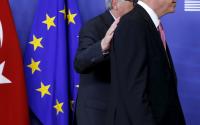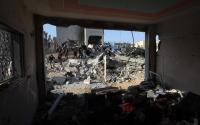Indictment of 8 Underlines Emergence of Europe as a Center of Militant Plots
The attempt failed when the insurgents squabbled, splitting into rival factions. One faction coalesced under the leadership of a Palestinian, Anwar Adnan Mohammed Saleh, the order says.
The group, known as the Soldiers of Allah, distributed literature at the mosque about the activities of Muslim militants in Algeria, the Palestinian territories, Egypt and Afghanistan, including communiqués issued by Mr. bin Laden.
The report, according to the judge's order, says that Mr. Saleh and a Syrian-born associate, Imad Eddin Barakat Yarkas, began to indoctrinate young Muslims who expressed interest in the literature, recruiting several to fight in Bosnia, where Muslims were at war with the Serbs.
In 1995, Mr. Saleh left Spain suddenly, moving to Peshawar, Pakistan, where he began to work with the fledgling organization that would become Qaida, moving Muslim militants across the border into Afghanistan for training in the terrorist camps established there by Mr. bin Laden, the document says.
In Spain, Mr. Yarkas took charge after Mr. Saleh's departure, at a time when Arab immigration was rising because of Spain's entry into the European Union, which created tremendous employment opportunities.
Judge Garzon's account is based in part on years of telephone intercepts by the Spanish authorities. The document makes clear that Spanish intelligence has been watching Mr. Yarkas and listening to him in his interactions with other suspected Qaida operatives around Europe and Asia since at least 1997.
The order says that the evidence tying the Madrid cell to the Sept. 11 attacks rests on two elements. Mr. Yarkas's Madrid phone number was found by the German police in the Hamburg apartment believed to have been used by two of the hijackers and several other Islamic terrorists to plot the Sept. 11 attacks, Judge Garzon's order says. It lists among Mr. Yarkas's European "contacts" four of the Hamburg apartment's occupants, including Mr. Atta, who piloted the plane that hit the first World Trade Center tower.
Judge Garzon also quotes several intercepted phone conversations during August and September in which Mr. Yarkas is said to have conversed in cryptic language with a Qaida operative identified as Shakur, who is described elsewhere in the document as "a presumed member of the Sept. 11 suicide commandos."
"I've cut off all of my old relationships," the report says Mr. Shakur told Mr. Yarkas in August. "I've prepared some things that I think you're going to like."
"I'm more at ease psychologically," Mr. Shakur told Mr. Yarkas three weeks later, according to the judge's order. "In these moments, I'm doing one thing. I'm giving classes, we've entered the field of aviation, and we've even cut the throat of the bird."
Mr. Garzon commented on the care with which the two Islamic men, seemingly aware that the authorities could be eavesdropping, addressed each other. "The extreme security measures and the cryptic nature of the conversations suggest, circumstantially, that they are referring to the attacks," the judge said.
If the report is correct, Mr. Yarkas was leading an extraordinary double life. A balding, bearded man of about 40, he married a Spanish woman who converted to Islam and began to cover her hair, his neighbors said in interviews. He bought a fourth-floor condominium in a spacious building populated with architects and civil servants and listed his name and address in the Madrid phone book. He made it his practice to drive his four children to school at Madrid's largest mosque, his neighbors said.
At the same time, according to the judge's order, Mr. Yarkas stepped up his recruitment of Muslim militants and began to travel widely, making more than 20 trips to Britain since 1996 for meetings with leaders of the mujahidin movement there. He also traveled to Turkey, Belgium, Denmark, Sweden, Indonesia, Malaysia and Jordan.
Mr. Yarkas adopted as a close lieutenant Jasem Mahboule, an Islamic warrior who fought in Bosnia before settling in Spain and later trained twice in Afghanistan and traveled to Yemen on Qaida business, according to the judge's report.
A bearded man who always wore steel-rimmed shaded glasses, he, too, married a Spanish woman, who converted at his request to Islam, his neighbors said. The couple moved in 1999 into an attractive housing project in southern Madrid, paying minimal rent in a program subsidized by the city government, the neighbors said.
Mr. Mahboule was less gregarious than Mr. Yarkas. But when the residents of his street collected money to plant a promenade of olive trees facing their homes, he donated money for their purchase and helped to water the saplings.
In their secret lives, according to the document, Mr. Mahboule and Mr. Yarkas were coordinating subordinates, most of them men from Syria and North Africa with legal Spanish immigration status, in a scheme to purloin credit cards and use them fraudulently to raise funds for Qaida, the judge's order says. The Madrid cell raised thousands of dollars, which were used to finance the recruitment and travel of young Muslims to terrorist camps in Afghanistan and Indonesia.
One recent recruit who trained in Indonesia in July was Luis Jose Galan Gonzalez, a 37-year-old Spaniard, the judge's order says. The son of an affluent Madrid family, Mr. Galan converted to Islam more than a decade ago and married a Moroccan woman, according to Spanish press reports. In recent years, he worked as a telephone operator at a package courier company.
Mr. Galan, Mr. Yarkas and Mr. Mahboule all prayed regularly at the Islamic Cultural Center, Madrid's largest mosque, an ivory-colored building with a minaret, perched overlooking a major thoroughfare.
Mohammed Afifi, the mosque's spokesman, said in an interview Monday that Mr. Yarkas and Mr. Mahboule were discreet men who attracted little attention. But Mr. Galan liked to stand out.
"He was a loudmouth, always shouting out his beliefs," Mr. Afifi said.
In two recent demonstrations in Madrid to protest the Afghan war, Mr. Galan argued two conflicting views of the Sept. 11 terrorism. In one, he condemned it. In another, he justified it.






